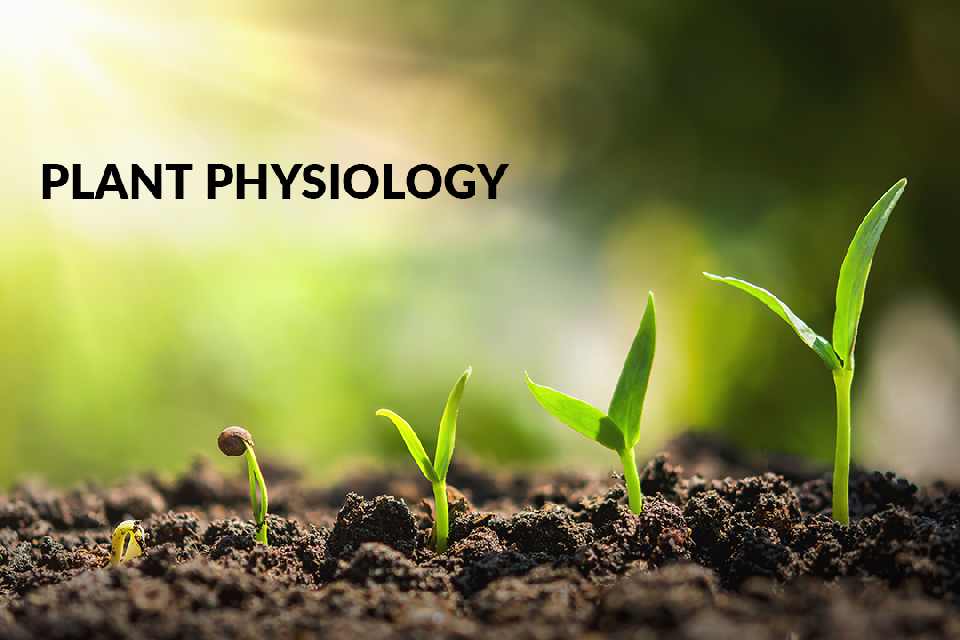Understanding the Basics of Plant Physiology

The physiology and functioning of plants are described in plant physiology. It’s a botanical subcategory that mainly covers photosynthesis, respiration, hormone functions, nastic motions, feeding, phototropism, circadian rhythms, tropisms, and parthenogenesis. Environmental stress physiology, seed germination, dormancy, and stomata function are covered in the section. Genetics, plant morphology and ecology, phytochemistry, biophysics, cell biology, and molecular biology are strongly related to the topic.
Understanding the structure and function is essential for understanding the plant’s way of life. Plant physiology explains how plants live and reproduce. As a result, learning the subject is required to understand plants better. Now, we will explain the role of plant physiology in greater depth.
Plant Physiology’s Contribution to Knowledge Development
Plant physiology is concerned with all of the plant’s internal processes. The topic examines the most important physical and biochemical systems in plants, including activities on various time and magnitude scales. In simpler words, molecular processes like photosynthesis, internal mineral mobility, hydration, and nutrient absorption are investigated. Seasonal variation, plant growth, reproduction control, and dormancy are all examples of investigated large-scale processes.
Now we’ll discuss the essential topics for developing knowledge in the following areas.
Plant physiology’s Phytochemistry or Plant Chemistry
It is one of the domain’s most important knowledge domains. Plants must produce a variety of chemical substances to survive and operate. Many of these chemicals are one-of-a-kind, as they haven’t been found in any other creature. To accomplish the photosynthetic process, the plants must produce a variety of proteins, pigments, and other substances since they can’t move because they’re stuck to the ground. As a result, chemical substances are created for defensive purposes as well. Pathogens, herbivores, and other organisms produce the chemicals. Toxins are produced in the majority of instances.
Plants also create offensive-smelling and foul-tasting compounds as a form of self-defence. In addition, certain substances provide disease resistance. Finally, plants need to survive during droughts, and thus chemical substances can also be used for this purpose.
Processes in the Cell: The topic seeks to broaden students’ understanding of chemical and biological interactions in cells. A plant’s cells have a variety of characteristics, and these characteristics differ from that of animal cells. Plant cells react and function differently from animal cells due to their distinct characteristics.
The membranes of a plant cell, for instance, are more rigid. As a result, the structure of cells is influenced by these membranes. The barriers likewise constrain the plants’ mobility and suppleness. Another distinguishing aspect of these cells is the presence of chlorophyll.
It’s a type of chemical molecule that interacts with sunlight. Plants can produce their nourishment as a result of such interactions, and this is one of their distinguishing characteristics. In this aspect, the plants are entirely self-sufficient. It claims that the subject is beneficial in helping students grasp the unique processes that occur within plant cells.
Cellular interactions: Plant cells, tissues, and structures all interact differently. Distinct cells are assigned different responsibilities. Those capable of doing the duties have unique physical and chemical capabilities. The rhizoids and roots, for instance, are important in keeping the plant in place. These components are also essential for obtaining nutrients from the soil. Another vital component of the plant is the leaf. In sunlight, the leaves help the plant produce the required nutrients. The roots and rhizoids gather minerals transmitted to the leaves.
The nutrients produced in the leaves are subsequently sent to the roots. Transportation duties can be carried out in a variety of ways. The vascular tissues, for instance, are an important element of the process. It demonstrates that the subject focuses on comprehending the mechanisms through which plants develop.
Interaction with the Environment: All plants interact with their surroundings in a variety of ways. The study of plant physiology also aids in the development of an understanding of how plants interact with their surroundings. Plants respond differently to different sorts of environmental variables. The relevance of understanding how reactions alter with exogenous conditions is stressed in this topic. The issue emphasizes the need to describe how plants get stressed due to water loss.
The subject also includes a discussion of changes in air chemistry. With crowding, a plant’s mode of functioning alters. Biochemical, genetic, and physical variables all play a role in these alterations. Plant physiology also looks at how various elements affect the functioning of the plant.
Plant Physiology’s Importance in Agriculture
Plant physiology research is crucial in agriculture, and this is the science and art of cultivating plants. Agriculture is the foundation of our modern civilization’s growth. Domesticated species farming produces food supply, allowing humans to live in cities. Agronomy, plant breeding, and agrochemicals, like fertilizer and pesticide usage, are all part of contemporary agriculture. Traditional agricultural practices have undergone considerable changes because of technological advancements. The number of crops has expanded as a result of technological advancements. The technical advancements also resulted in ecological and economic transformations.
Exhaustion of aquifers, climate change, deforestation, and the usage of growth artificial hormones have all influenced current agricultural techniques. Another important development in agriculture is the rise in interest in genetically modified crops. The agriculture industry’s goods are divided into four categories: fibres, foods, raw materials, and fuels. Vegetables, grains, oil, and fruit are the food items produced by the agricultural business.
Understanding the physiological variables connected with plants is required for efficient agricultural operations. Therefore, crop physiology is a crucial aspect of the study. It focuses on the understanding of various plant processes. The activities that drive plant life, the development processes, and the cost-effective generation of crop plants are the core topics of interest in plant physiology.
This field encompasses mainly basic and practical research aimed at determining the functions of agricultural plants. Basic agricultural physiology research emphasizes the necessity of expanding knowledge in the field. On the other hand, applied research places a premium on resolving real-world issues while crop physiology investigates plants and plant ecosystems overall. It is due to the procedures that regulate production. The study of how plants interact with their surroundings is equally important in this field.
The Most Important Aspects of Crop Physiology
- Breeding of Plants: Crop modification is a common method in agriculture. Crop modification through breeding results in alterations in the plant’s genomic structure. It aids farmers in the growth of crops with more advantageous characteristics. As a result, such crops are becoming more societally acceptable. In this scenario, bigger vegetables/fruits or seeds are an example since they are more cost-effective. Another important application is the cultivation of drought-tolerant crops. Such crops may be grown in a variety of extreme environments. Farmers can now create pest-resistant crops thanks to recent advances in crop physiology and plant breeding. These products are less likely to be harmed, resulting in lowered agricultural losses.
- Plant breeding has progressed significantly: Many new developments have occurred in the field of plant breeding. These discoveries are founded on plant physiology research conducted by Gregor Mendel. His research contributed to the understanding of recessive and dominant genes. For so many years, the results were overlooked. Plant breeders later gained a better grasp of breeding methods and genetics thanks to the same discoveries. Crop breeding innovation is extensively utilized, and it comprises procedures that allow growers to select a plant with durable qualities. Other advancements in the sector involve cross-pollination, self-pollination, and molecular methods to genetically change the organism.
- Plant domestication:
Domestication is another key aspect of agricultural activity. It aids in the development of disease resistance. It also helps to boost drought resistance. Domestication also makes harvesting more convenient. Another advantage of domestication is that the taste of the crops enhances. Lastly, domestication improves the food’s nutritious worth, another advantage of plant domestication.
Crop physiology awareness also aids farmers in comprehending the impacts of different agricultural strategies like pest control with drugs, fertilizer use, and development control with chemicals. Crop variety is also seen as a result of climate changes and genetics. - Plant Genetic Engineering: It is vital to investigate the physiological characteristics of plants to evaluate the consequences of genetic engineering. GMOs (genetically modified organisms) are organisms with altered genes. The genetic components are altered using genetic engineering procedures, and recombinant DNA technology is another name. These methods are frequently employed in the development of newer crops. Other advantages of genetically engineered plants include greater nutrient benefits, better durability, and improved disease and insect resistance.
- Seeds that are resistant to herbicides are being developed: Herbicide-resistant plants are now being developed. Seed is another example of genetic modification and its uses in plant physiology research. When the gene in the seeds is altered, the plants can withstand larger levels of herbicide contamination. One of the most important aspects of farming is weed control. Farmers can grow a crop that can withstand herbicides by employing modified seeds. As a result, weed control on the farms becomes simple.
- Crops that are resistant to insects are being developed: Insect-resistant crops are developed using genetic modification techniques. These crops have been genetically engineered using a gene discovered in the Bacillus Thuringiensis soil bacteria. For the insects, these crops produce poison to avoid insect infestations.
- Adapting to Climate Change
One of the most pressing challenges in today’s agroecosystems is global warming. The effects of global warming and agricultural practices are intertwined, and variations in normal temperatures caused by global warming influence agriculture. Rainfall patterns are also changing as a result of global warming. Weather extremes are becoming increasingly common due to the shifting nature of the planet’s climate.
Heatwaves and thunderstorms, for instance, are extremely common nowadays. Variations in the weather lead to changes in environmental pests and pathogens. In addition, ground-level ozone concentrations, like atmospheric carbon dioxide, fluctuate as the climate changes. It suggests that plants are being subjected to more severe weather in recent times.
Crops are being affected by harsh weather in a variety of ways. Due to the unfavourable effects of weather, the nutritional content of the crops is changing. In addition, sea levels are rising as a result of global warming. Crop productivity in low-altitude nations has been impacted as a result. In some locations, global warming may result in food scarcity. Understanding plant physiology is extremely important in these situations for developing crop-protection methods.
Plant physiology’s role in horticulture
Horticulture is another field that is intimately linked to plant physiology. It is described as a field of study that encompasses plant cultivation. Horticulture is largely concerned with producing food and other resources for aesthetic and convenience purposes. Restoration of the environment, plant preservation, soil management, garden and terrain design, and garden development and upkeep are the primary areas of attention in the horticulture sector.
Horticulture’s most important areas
Horticulture’s major operations can be described in the following way.
- Pomology: It is concerned with the cultivation of fruits. Pomology is primarily concerned with cultivating pome fruits crops like apple, pear, and quince. Stone fruit cultivation, like nectarine, peach, cherry, apricot, and plum, is also included. In addition, pomology deals with the production of tiny fruits, including blueberry, raspberry, strawberry, and grape. Ultimately, one of the most significant operations in the subject of Pomology is the cultivation of nut tree fruits.
- Vegetable Production: It is an activity that is concerned with the cultivation of food crops. Vegetable plants are used to produce crops. Here different parts of the plant can be used as food like fruits, stems, seeds etc.
- Floriculture: It’s a domain dedicated to flower cultivation. This domain concentrates on cultivating bedding plants, potted plants, bulbs, and floral designs.
- Environmental Horticulture: It is the area that concerns the cultivation of woody and herbaceous nursery plants. The area also focuses greatly on landscape management and design.
- Postharvest Physiology: This branch of horticulture is responsible for harvesting, processing, and storing crops. Flowers, fruits, and vegetables are among the crops handled as part of the domain.
The magnitude of production is the main distinction between agriculture and horticulture. Agriculture seeks to produce a significant quantity of a crop. On the other hand, Horticulture focuses on growing a crop on a lesser scale. Nevertheless, understanding plant physiology is extremely important in both disciplines. Horticulture requires expertise, understanding, and technology to produce plants that fulfil both food and non-food necessities. For cultivation and reproduction, an understanding of plant physiology is essential.
The use of knowledge strives to enhance plant growth rates, increase yields and quality, and boost the nutritional value. The prevalence of insects in horticulture might harm the plants. Plants may be harmed by diseases in the same way also. Plant physiology awareness is essential for preventing such invasions. It implies that knowledge is also beneficial for devising damage-recovery measures.
Frequently Asked Questions
What is plant physiology?
Plant physiology is a branch of botany that studies how plants work and aims to explore their physiology.
Which field of plant physiology has the broadest scope for employment?
In agriculture, plant physiology has a broad variety of professional applications. Plant physiology has applications in agriculture, health, food supply, and textile industries.
What are the different career paths to choose after studying plant physiology
Different fields like botany, horticulture, academics, etc., are the different types of careers that one can choose after studying plant physiology.
Total Assignment Help
Incase, you are looking for an opportunity to work from home and earn big money. TotalAssignmenthelp Affiliate program is the best choice for you.
Do visit :https://www.totalassignmenthelp.com/affiliate-program for more details
Total Assignment help is an assignment help Online service available in 9 countries. Our local operations span across Australia, US, UK, South east Asia and the Middle East. With extensive experience in academic writing, Total assignment help has a strong track record delivering quality writing at a nominal price that meet the unique needs of students in our local markets.
We have specialized network of highly trained writers, who can provide best possible assignment help solution for all your needs. Next time you are looking for assignment help, make sure to give us a try.
Looking for Assignment Help from Top Experts ?
Get the best Assignment Help from leading experts from the field of academics with assured onetime, 100% plagiarism free and top Quality delivery.



